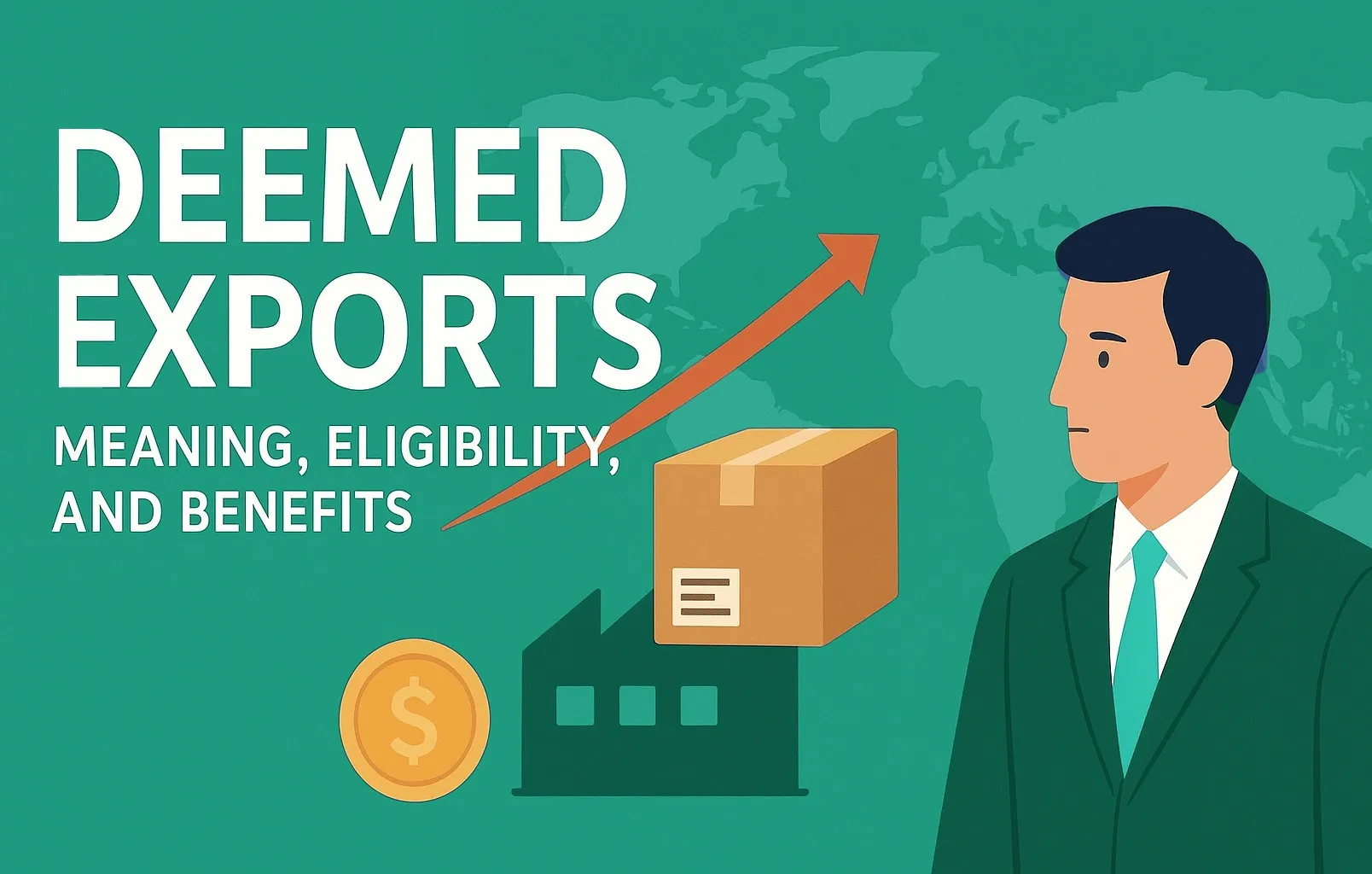Deemed Exports: Meaning, Eligibility, and Benefits
Discover what deemed exports mean under India’s EXIM and GST framework. Learn how businesses can leverage deemed export policies to enhance profitability and compliance.

Deemed exports help encourage international trade as developed domestic manufacturing creates an incentive for suppliers. Comprehending the concept of deemed exports becomes pretty relevant to the functioning of the organization when it is striving to make its businesses function effectively by making the proper utilization of the policies of the government. In this regard, this chapter defines and elaborates on what deemed exports are, what constitutes a beneficiary exporter for those, and the incentives under the export policy.
What are Deemed Exports?
Deemed exports are sales where the goods or products manufactured in India are sold within India but treated as exports for those benefits. Since these goods do not physically move out of Indian territory, they are eligible for certain incentives that accrue to the actual exports. The Export and Import (EXIM) Policy defines deemed exports as the manufacture of goods in India that are supplied locally either for payment wholly or partly in Indian Rupees or convertible foreign exchange. For instance, if an industry manufacturing machinery sells machinery located in India to an EOU that further employs such machinery to produce goods for export, then the transaction will be considered as a deemed export. This classification's rationale is behind the domestic suppliers in an attempt to sustain them without allowing the exports of any products.
Eligibility Criteria for Deemed Exports
To qualify as deemed exports under the export policy, certain conditions must be met:
- Goods Only: Only physical goods are considered for this scheme. Services fall into no category.
- Produced in India: The product should be manufactured or produced within the geographical boundaries of India. Goods imported from outside India are not considered.
- No Physical Movement Outside India: Goods to be covered in the sale need to be present and remain in India and cannot be shipped outside India.
- Government Notification: It is mandatory that deemed exports authorize the Central Government officially vide Section 147 of the Central Goods and Services Tax (CGST) Act, 2017.
- Payment Terms: Payments can be received only in Indian Rupees or any convertible foreign exchange.
- GST Compliance: GST paid at the time of supply should also be provided on the deemed export supplies. However, the refund on such supplies can also be claimed later.
- Specific Transactions: Specific transactions are those that come under the broad head of deemed export and are exported. For example, Advance Authorization (AA), Duty-Free Import Authorization (DFIA), and supplies made by EOUs.
Benefits of Deemed Exports
The deemed exports scheme offers several advantages that can significantly enhance a supplier's competitiveness and profitability:
- Duty Exemptions
Among the strongest attractions offered by deemed exports, one of them is relief from terminal excise duty or a full refund of duties paid. This conserves the working capital of suppliers while making them more competitive both locally and internationally.
- Advance Licensing Opportunities
The advance licenses for the deemed exporters can be obtained for various purposes, such as intermediate supply and Duty-Free Replenishment Certificates. These licenses enable simplification in operations and help in cost control.
- Special Import License Eligibility
Manufacturers engaged with exports declared by the applicant under deemed exports are sometimes eligible for a special license to import, normally at 6% of Freight on Board (FOB) value. This will enable them to import raw materials or inputs at reduced costs, which guarantees the continuity and growth of their business.
- Deemed Export Drawback Scheme
The suppliers receiving advance releases under an Advance Release Order or a Back-to-Back Letter of Credit may also opt for the Deemed Export Drawback Scheme wherein drawback refund of terminal excise duty is available along with the Special Imprest License.
- Support for EPCG License Holders
Even exporters selling products to deeming recipients under an EPCG license can benefit from the deemed exports scheme. That would be a useful exception as suppliers would, in such cases, be able to derive the benefits of deemed exports if they, as part of the operations of their business, satisfy certain specific regulatory mandates.
Deemed Exports Under GST Framework
Deemed exports are treated differently under the GST regime than other exports. While the latter is zero-rated, meaning no tax is levied under GST, the former is taxed under GST at applicable rates. However, suppliers can claim a full refund of this tax paid on deemed export transactions. The Central Government has issued the various categories of transactions that will qualify as deemed exports under the conditions specified in the CGST Act. This ensures that businesses dealing with those kinds of transactions can recover their taxes while also complying with the regulatory needs.
Common Challenges Faced by Suppliers
While there are numerous benefits associated with deemed exports, suppliers may encounter challenges such as:
- Complex Compliance Requirements: Uncomfortably high compliance requirements surely overwhelm companies that have no experience or knowledge about export policies.
- Documentation Burden: All the documentation for the deemed export scheme needs to be accurate and present in full.
- Market Awareness: The change in government policies and the situation in the market is something that one needs to be aware of so that one can identify the maximum benefits being received through deemed exports.
Final Thoughts
Since you are now aware of what happens under deemed exports, including the very eligibility criteria as well as benefits, let's look into how this approach may help your business. Always verify all documents relating to your transaction to ascertain whether you are in line with government requirements. Use these insights into deemed exports effectively, and you can optimize the functioning of your supply chain, contributing to India's growing economy through better manufacturing capabilities as well as international trade engagements. Continue being proactive in this space for continued growth and success in your business endeavors.